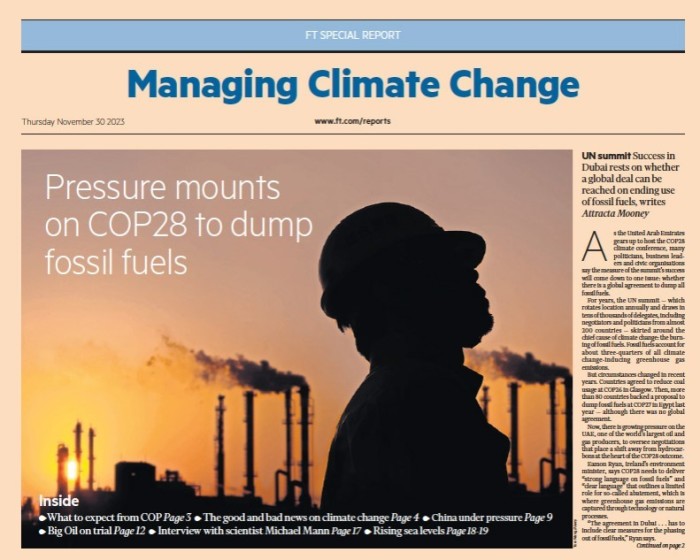Why the legitimacy of carbon credits matters for African businesses

Roula Khalaf, Editor of the FT, selects her favourite stories in this weekly newsletter.
Valerie Labi’s mission is to convince Ghana’s growing delivery and courier market to abandon their petrol-thirsty motorcycles and replace them with electric bikes.
But, to make it work, the co-founder of German-Ghanaian start-up Wahu Mobility will have to sell more than the pedal-assisted, designed and made-in-Ghana e-bikes that her Accra factory is beginning to churn out. She will have to sell carbon credits.
Without a cross-subsidy from the sale of carbon credits, Wahu’s bikes would be priced at about $2,000 — much too expensive for its target market of delivery-fleet riders. “We cannot scale without carbon at that price point,” she says.
Wahu’s plan is to sell carbon credits within the framework of a bilateral agreement signed between Switzerland and Ghana (and Vanuatu) at last November’s COP27 climate summit in Sharm el-Sheikh. Under the deal, which comes under Article 6.2 of the Paris Agreement, Accra will act as broker for Internationally Transferred Mitigation Outcomes to Switzerland. In return, Ghana’s government will take a cut, with the rest of the payment going to Wahu.
Carbon credits are broadly divided between cheaper credits in voluntary markets, where the quality can be questionable, and more expensive credits in regulated markets, such as the EU’s Emissions Trading System.
Wahu’s proposition is that its bikes will induce companies such as Bolt and Glovo, to switch to electric in their food-delivery and courier businesses. So-called smart monitoring of e-bikes will provide records of distances travelled and carbon emissions avoided. Wahu has been given a $200,000 grant to hire First Climate, a Swiss consultancy, to develop its carbon-pricing model.
For some African climate-related businesses, such as Wahu, the successful functioning of carbon markets is not a nice-to-have, but core to their strategy. Unfortunately for them, these markets’ credibility has taken a battering, with rising scepticism about the utility of credits linked to avoided emissions.
That is particularly true in the forestry sector. A report in UK newspaper The Guardian in January alleged that 90 per cent of rainforest carbon offsets certified by Verra, a standard for voluntary carbon credits, were worthless. Verra disputes the methodology and the conclusions, but the allegations have undermined confidence in carbon offsets as a credible tool for big companies, from Shell to Gucci, to use in their net zero emission strategies.

This article is part of an FT special report on Managing Climate Change
In October, South Pole, a Swiss company that sells carbon offsets, ended its agreement with a project owner and developer in Zimbabwe that had generated millions of carbon credits from the prevention of deforestation around Lake Kariba. The credits, many argued, were not worth the paper they were written on.
As a result of these and other setbacks, prices of carbon offsets traded by Xpansiv, which operates a carbon exchange, have fallen by more than 80 per cent in less than two years. Its Global Emission Offset contract, used by airlines to offset carbon emissions, was trading at 44 cents in November, down from $3.43 at the start of the year.
Despite the setbacks, many insist that carbon credits are an indispensable part of fighting climate change and deforestation. One sector in Africa that depends heavily on the acceptance of such credits is clean cookstoves.
Kenya-based company Burn designs and makes stoves in Nairobi that significantly reduce wood and charcoal used for cooking. It then sells credits derived from the reduced emissions compared with those that would have resulted from felling trees and burning wood. And it uses the money to subsidise the cost of cookstoves, reducing the price of a wood stove from $20 to $5.
Molly Brown, head of carbon strategy at Burn, acknowledges the controversy around credits and the damage that has done to prices. “There’s a lot of work going on around what kind of claims companies can credibly make,” she says. “We all know that if you’re going from being BP to being net zero BP in the next five years, even if you decrease the oil [you produce], there’s still millions of tonnes of CO₂ you’re emitting. How can you make sure that you offset that and what kinds of claims can you credibly make about that?”
The cookstove industry, Brown says, is working on new standards to meet the demand. One is the so-called fraction of non-renewable biomass (or fNRB), which measures how much wood can be cut without damaging a forest. A certain amount of cutting or burning is sustainable, she says, since any forest will naturally grow each year. The fNRB seeks to quantify safe levels.
“We know that charcoal is a huge driver of deforestation in the Congo Basin, so we want to be protecting it, we want to be reducing the amount of charcoal that’s being burnt,” says Brown. But calculations are complex and, in order to put such claims on a credible footing, she cautions, they need to be “triple-checked [and] peer-reviewed”.
When it comes to deforestation, it is not only voluntary markets that are being tested. Lee White, Gabon’s minister of water, forests, the sea and environment until August, was seeking to monetise carbon sequestered by rainforests that cover 90 per cent of the country.
Last year, he came to market with 90mn tonnes of carbon credits generated from improved forestry practices in Gabon, one of the few nations that is a net remover of carbon. “The UNFCCC [UN Framework Convention on Climate Change] never came up with a methodology of converting reductions into sellable credits,” complains White. “It is a failure of the UN system.”
White lost his job this year after the administration of which he was part, headed by President Ali Bongo, was ousted in a military coup. Not all attempts to sell carbon credits end so dramatically, but his is a cautionary tale.
“People call me an expert,” White says of his efforts to prove and register Gabon’s millions of tonnes of carbon credits. “I said: you can call me an expert when we finally sell them.”
This article has been amended to clarify the circumstances of South Pole’s withdrawal from a carbon offset project in Zimbabwe
Climate Capital

Where climate change meets business, markets and politics. Explore the FT’s coverage here.
Are you curious about the FT’s environmental sustainability commitments? Find out more about our science-based targets here
Letter in response to this article:
Don’t overlook the role of the carbon credits market / From Maria Mendiluce, Chief Executive, We Mean Business Coalition, New York, NY, US

Comments